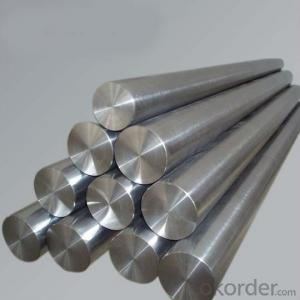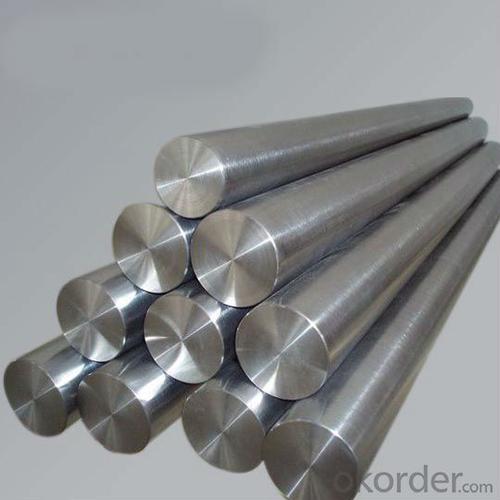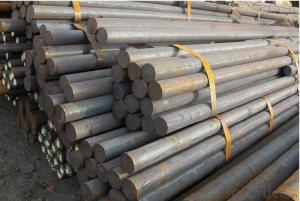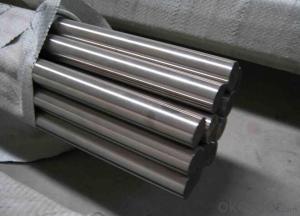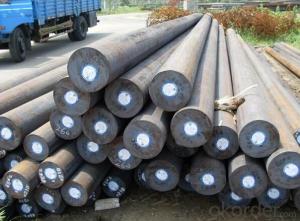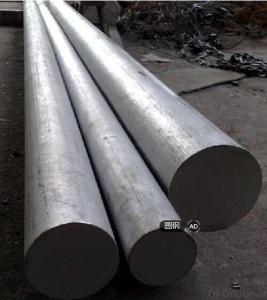Alloy Steel Round Bar Steel Material 1..3343
- Loading Port:
- Dalian
- Payment Terms:
- TT OR LC
- Min Order Qty:
- 5 m.t.
- Supply Capability:
- 1000 m.t./month
OKorder Service Pledge
OKorder Financial Service
You Might Also Like
Specification
Alloy Steel Round Bar Steel Material 1..3343
Quick Details
Standard: AISI, ASTM, BS, DIN, GB, JIS
Model Number:W6Mo5Cr4V2/M2/skh9/1.3343
Technique: Cold Drawn
Application: Tool Steel Bar
Alloy Or Not: Is Alloy
Special Use: Mold Steel
Type: Alloy Steel Bar
Cold drawn bar: 2.2-14.0mm
Hot rolled plate: 6.5-16.0mm
Hot rolled circular plate: 8-80mm
Precisely forged bar: 81-250mm
Chemical Composition(GB)%
Standard | C | Si | Mn | P | S | Cr | W | Mo | V |
W6Mo5Cr4V2 | 0.55-0.65 | ≤0.40 | ≤0.60 | ≤0.030 | ≤0.020 | 3.70-4.30 | 6.00-7.00 | 4.50-5.50 | 1.70-1.10 |
M2 | 0.78-0.88 | 0.20-0.45 | 0.15-0.40 | ≤0.030 | ≤0.030 | 3.75-4.50 | 5.50-6.75 | 4.50-5.50 | 1.75-2.20 |
Heat Treatment
Item | Temperature℃ | Hardness |
Anneal | 840-860 | ≤255HB |
Quenching | 1150-1180 | ≥60HRC |
Tempering | 560-580 | ≥60HRC |
Characterstics
Good thermal plasticity |
High abrasion resistance and red hardness |
Applications:
Used for various tools,large thermoplastic forming cutting tools,abrasion resistance components operating under high load such as cold extrusion dies
Picture
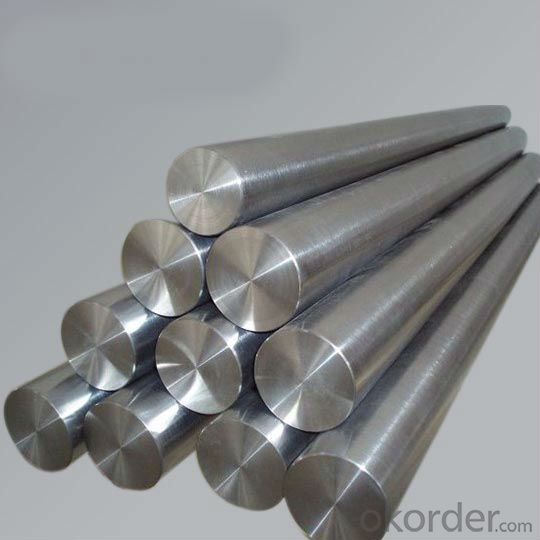
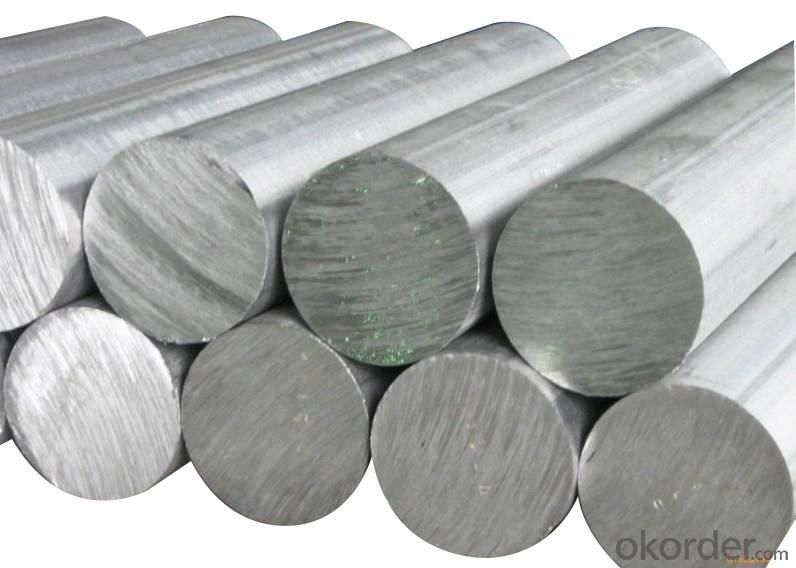
- Q: What are the advantages of using cobalt-alloy steel round bars?
- Using cobalt-alloy steel round bars in various industries and applications offers several advantages. Firstly, this type of steel is exceptionally strong and hard, providing resistance against wear, corrosion, and high temperatures. This makes it suitable for demanding environments where other materials would quickly degrade. Secondly, cobalt-alloy steel maintains its shape and size even under extreme conditions, demonstrating excellent dimensional stability. This makes it ideal for applications that require precise tolerances and minimal deformation, such as in the aerospace and automotive industries. Moreover, cobalt-alloy steel retains its mechanical properties at elevated temperatures, showcasing excellent heat resistance. This makes it valuable in applications involving high-speed machining, cutting tools, and turbine components. Additionally, cobalt-alloy steel round bars are easily machined and fabricated, offering versatility and customization in various applications. Their high machinability and weldability make them suitable for use in manufacturing processes like forging, casting, and machining. Furthermore, cobalt-alloy steel round bars exhibit excellent fatigue resistance, ensuring long-lasting performance and durability. This makes them suitable for applications involving repetitive stress or cyclic loading, such as shafts, springs, and fasteners. Lastly, cobalt-alloy steel is biocompatible, making it suitable for medical and dental applications. Its corrosion resistance and biocompatibility properties make it commonly used in orthopedic implants, surgical tools, and dental instruments. In conclusion, the advantages of using cobalt-alloy steel round bars include exceptional strength, hardness, and dimensional stability, as well as heat resistance, machinability, fatigue resistance, and biocompatibility. These qualities make them valuable across a wide range of industries and applications, offering reliability, durability, and performance.
- Q: What are the advantages of using steel round bars over other materials?
- There are several advantages to using steel round bars over other materials: 1. Strength and durability: Steel round bars are known for their high strength and durability, making them suitable for various applications. They can withstand heavy loads and resist deformation, making them ideal for structural purposes. 2. Versatility: Steel round bars come in a wide range of sizes, grades, and finishes, making them highly versatile. They can be easily customized to meet specific requirements, such as different lengths, diameters, and surface finishes. 3. Cost-effective: Steel round bars offer a cost-effective solution compared to other materials. Their abundance and efficient manufacturing processes make them readily available and affordable. Additionally, their high strength-to-weight ratio allows for the use of smaller quantities of steel while achieving the same level of strength. 4. Corrosion resistance: Steel round bars can be produced with different finishes, including galvanized or stainless steel, which enhances their resistance to corrosion. This makes them suitable for outdoor applications or in environments where they may come into contact with moisture or chemicals. 5. Machinability: Steel round bars are known for their excellent machinability, meaning they can be easily cut, drilled, or shaped to meet specific design requirements. This characteristic allows for efficient processing and reduces production costs. 6. Fire resistance: Steel is inherently fire-resistant and does not contribute to the spread of flames. This makes steel round bars a preferred choice in applications where fire safety is a concern, such as in construction or industrial settings. 7. Recyclability: Steel is highly recyclable, which makes steel round bars an environmentally friendly option. They can be easily melted down and reused to create new steel products without losing their properties or strength. Overall, the advantages of using steel round bars over other materials include their strength, durability, versatility, cost-effectiveness, corrosion resistance, machinability, fire resistance, and recyclability. These factors make steel round bars a preferred choice in various industries, including construction, manufacturing, automotive, and infrastructure projects.
- Q: Are steel round bars suitable for high-stress applications?
- Yes, steel round bars are suitable for high-stress applications. Steel is known for its strength and durability, making it an ideal material for high-stress environments. Round bars, in particular, offer excellent tensile strength and can withstand heavy loads and intense pressure. They are commonly used in industries such as construction, manufacturing, and engineering, where high-stress applications require a reliable and robust material. The round shape of the bars also provides uniformity in strength, ensuring consistent performance under extreme conditions. Additionally, steel round bars can be heat-treated to further enhance their mechanical properties, making them even more suitable for high-stress applications. Overall, steel round bars are a reliable and effective choice for demanding environments that require exceptional strength and resilience.
- Q: Grade 1 steel is round steel, grade two steel is ribbed thread steel. Are the weight of the two units the same?
- Grade two steel is ribbed steel, but the average diameter is calculated. The chemical composition of grade steel and grade two steel is different, but the density of them is the same. Therefore, the unit weight of grade 1 steel and grade two steel is the same.
- Q: How do you calculate the load capacity of a steel round bar?
- The load capacity of a steel round bar can be calculated using its cross-sectional area and the material's yield strength. The formula for calculating load capacity is Load Capacity = Cross-sectional Area × Yield Strength.
- Q: Can steel round bars be used in the oilfield equipment industry?
- Yes, steel round bars can be used in the oilfield equipment industry. Steel round bars are commonly used in the manufacturing of various components and structures in the oilfield equipment industry due to their strength, durability, and resistance to corrosion. These bars are often utilized in the construction of drilling tools, pipe fittings, valves, and other equipment needed for oil exploration, extraction, and transportation.
- Q: What are the advantages of using magnesium-alloy steel round bars?
- One advantage of using magnesium-alloy steel round bars is their high strength-to-weight ratio. These bars offer excellent strength and durability while being lightweight, making them suitable for applications where weight reduction is crucial, such as in aerospace and automotive industries. Furthermore, magnesium-alloy steel round bars exhibit good corrosion resistance, which extends their lifespan and makes them ideal for outdoor and marine applications. Additionally, these bars can be easily machined and formed, allowing for flexibility in design and fabrication processes.
- Q: What are the advantages of using nickel-cobalt alloy steel round bars?
- There are several advantages of using nickel-cobalt alloy steel round bars: 1. High Strength: Nickel-cobalt alloy steel round bars offer exceptional strength and toughness, making them suitable for applications that require heavy-duty performance. The addition of nickel and cobalt enhances the overall strength and hardness of the steel, allowing it to withstand high stress and pressure. 2. Corrosion Resistance: Nickel-cobalt alloy steel possesses excellent resistance to corrosion and oxidation. This makes it a preferred choice in environments where exposure to moisture, chemicals, or harsh weather conditions is common. The alloy's resistance to corrosion ensures durability and longevity, reducing the risk of rust or deterioration. 3. Heat Resistance: Nickel-cobalt alloy steel round bars exhibit superior heat resistance properties. They can withstand high temperatures without losing their structural integrity, making them suitable for applications involving heat treatment, such as forging or welding. This heat resistance ensures that the bars maintain their mechanical properties even under extreme thermal conditions. 4. Wear Resistance: The combination of nickel and cobalt in the alloy enhances its wear resistance. Nickel-cobalt alloy steel round bars exhibit excellent resistance to abrasion, erosion, and fatigue, making them ideal for applications in industries such as mining, construction, and automotive, where wear and tear are common. 5. Machinability: Nickel-cobalt alloy steel round bars are relatively easy to machine and fabricate. This makes them suitable for various manufacturing processes, including cutting, drilling, and shaping. The alloy's machinability allows for efficient production and reduces manufacturing costs. 6. Versatility: Nickel-cobalt alloy steel round bars have a wide range of applications due to their versatile properties. They can be used in industries such as aerospace, marine, oil and gas, automotive, and power generation. The alloy's combination of strength, corrosion resistance, and heat resistance makes it adaptable to diverse environments and demanding applications. In summary, nickel-cobalt alloy steel round bars offer numerous advantages, including high strength, corrosion resistance, heat resistance, wear resistance, machinability, and versatility. These properties make them a preferred choice for various industrial applications, ensuring durability, reliability, and performance.
- Q: What are the different treatments available for steel round bars?
- There are several different treatments available for steel round bars, depending on the desired properties and applications. Some common treatments include: 1. Heat Treatment: This process involves heating the steel round bars to a specific temperature and then cooling it rapidly or slowly to alter its mechanical properties. Heat treatment can improve hardness, strength, toughness, and resistance to wear and corrosion. 2. Quenching and Tempering: Quenching involves rapidly cooling the heated steel round bars in a liquid medium, such as water or oil, to increase hardness. Tempering follows quenching and involves reheating the steel to a lower temperature to reduce brittleness and increase toughness. 3. Surface Hardening: This treatment is used to increase the hardness of the outer layer of the steel round bar while maintaining a tough and ductile core. Common surface hardening methods include carburizing, nitriding, and induction hardening. 4. Cold Working: Cold working involves deforming the steel at room temperature through processes like rolling, drawing, or extrusion. This treatment can increase the strength and hardness of the steel round bars, while also improving dimensional accuracy and surface finish. 5. Coating: Applying a protective coating to steel round bars can enhance their resistance to corrosion and wear. Common coatings include zinc plating, galvanizing, and various types of paint or epoxy coatings. 6. Shot Blasting: This treatment involves shooting small metallic or abrasive particles at high speeds onto the surface of the steel round bars. Shot blasting can remove contaminants, scale, and rust, resulting in a clean and polished surface. It's important to note that the choice of treatment depends on the specific requirements of the steel round bars and the intended application. Consulting with experts or metallurgists is recommended to determine the most suitable treatment for a particular situation.
- Q: Can steel round bars be coated?
- Indeed, it is possible to coat steel round bars. Coating them yields numerous advantages, such as enhanced resistance to corrosion, increased durability, and improved visual appeal. The most commonly utilized coatings for steel round bars encompass galvanized coatings, epoxy coatings, and powder coatings. Galvanized coatings encompass the application of a zinc layer onto the steel's surface, which provides exceptional protection against corrosion. Epoxy coatings, on the other hand, find common application in industrial settings due to their remarkable chemical resistance and ability to withstand harsh environments. Powder coatings, involving the electrostatic application of a dry powder, are then cured under heat to form a robust and protective layer. These coatings can be employed on steel round bars to safeguard against rust and other forms of corrosion, thereby rendering them suitable for a broad scope of applications across various industries, including construction, manufacturing, and automotive.
Send your message to us
Alloy Steel Round Bar Steel Material 1..3343
- Loading Port:
- Dalian
- Payment Terms:
- TT OR LC
- Min Order Qty:
- 5 m.t.
- Supply Capability:
- 1000 m.t./month
OKorder Service Pledge
OKorder Financial Service
Similar products
Hot products
Hot Searches
Related keywords
